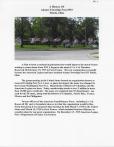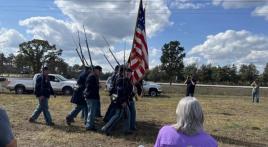I would like to tell the story of one boy, who in one day started the journey into becoming a Marine and a man:
I was drafted into the Army in November 1951. I was told to report to Wilkes-Barre, Pa., for induction. However, when I reported, a Marine Corps sergeant entered the room. He announced that he needed six recruits to fill his quota for the month. He asked for volunteers, and no one raised his hand. He left the room and reviewed all of our paperwork. An hour or so later, he returned and read out six names. Mine was the last name read, and so it was the Marine Corps — not the Army — for me.
I remember the long train ride all the way to South Carolina, where I would live and train for 12 weeks.
Around midnight, We arrived at Parris Island. We were ordered out of the bus and into long lines. Then, what seemed like a 7-foot giant appeared in the middle of us. This was our drill instructor. He was yelling and hitting some of us with a cardboard tube. All I could think was, "What the hell am I doing here?" After what seemed like hours of screaming, we were ordered into barracks. We were 54 scared boys with no idea what lay ahead.
The next day, we were ordered to fall out and marched to the barber shop. After half an hour, 54 young men stood out on the parade field — all without any hair on their heads. You could not recognize any of the boys you had made friends with.
"I'm Joe. Who are you?" I said to the guy next to me.
"I'm Roy," my buddy answered from the side of me.
Here everyone looked the same. We did not know it at the time, but this was to teach us that we were all the same, that no one was different from each other. The Marine Corps was breaking us down to nothing, and would now start the long process of building Marines. We would soon find that if one of us fouled up, all of us would pay the price by doing 100 push-ups, running five laps around the football field or cleaning up the barracks that weren't dirty. This taught everyone that we all had to depend on each other. No one cared what the other's religious beliefs were or what the color of his skin was.
I recall around Christmas, our platoon had a softball game against another platoon. We were told that the reward for winning would be to see a movie. The loser would have “Sand Field Day”: Each Marine would bring a bucket of sand and a bucket of water to the barracks. The sand would be dumped out and the Marines would clean the floor until not a grain of sand remained. Our platoon won the softball game; however, the drill instructor said, “You might as well all do it.”
He didn’t mean the movie.
It took hours to get that floor clean with brooms, mops and squeegees. In truth, however, I remember us having fun cleaning that barracks floor.
After 12 hard weeks of boot camp, we finally graduated. I can't explain the pride I felt that day on the parade field. Even that 7-foot drill sergeant may have shed a tear of pride in what we had become. We were given our first stripe and were sent home with 10 days' leave. We also received private first class pay: $90 per month. I sent $80 of that home to my mom.
After that, we all got our assignments. Some of us — including Roy, several boys from Wilkes-Barre and I — would head to Camp Pendleton, Calif., for advanced infantry training. It was then that I knew I would end up in Korea.
After five months of weapons training, I boarded a troop ship with 6,000 other Marines. My "cruise" took 21 days. I became so seasick that I only was able to eat for eight of those 21 days. My buddy Roy would bring me toast from the mess hall. Slowly I began to eat, but I had lost 10 pounds.
As the ship neared land, we saw the mountains of Korea in the distance. We knew it wouldn't be long before we would answer the question in each of our minds: "Would I be able to kill another human being?"
Joseph R. Barna
USMC Korea 1952-1953
934 Walnut St.
Freeland, Pa. 18224
570-636-2816




